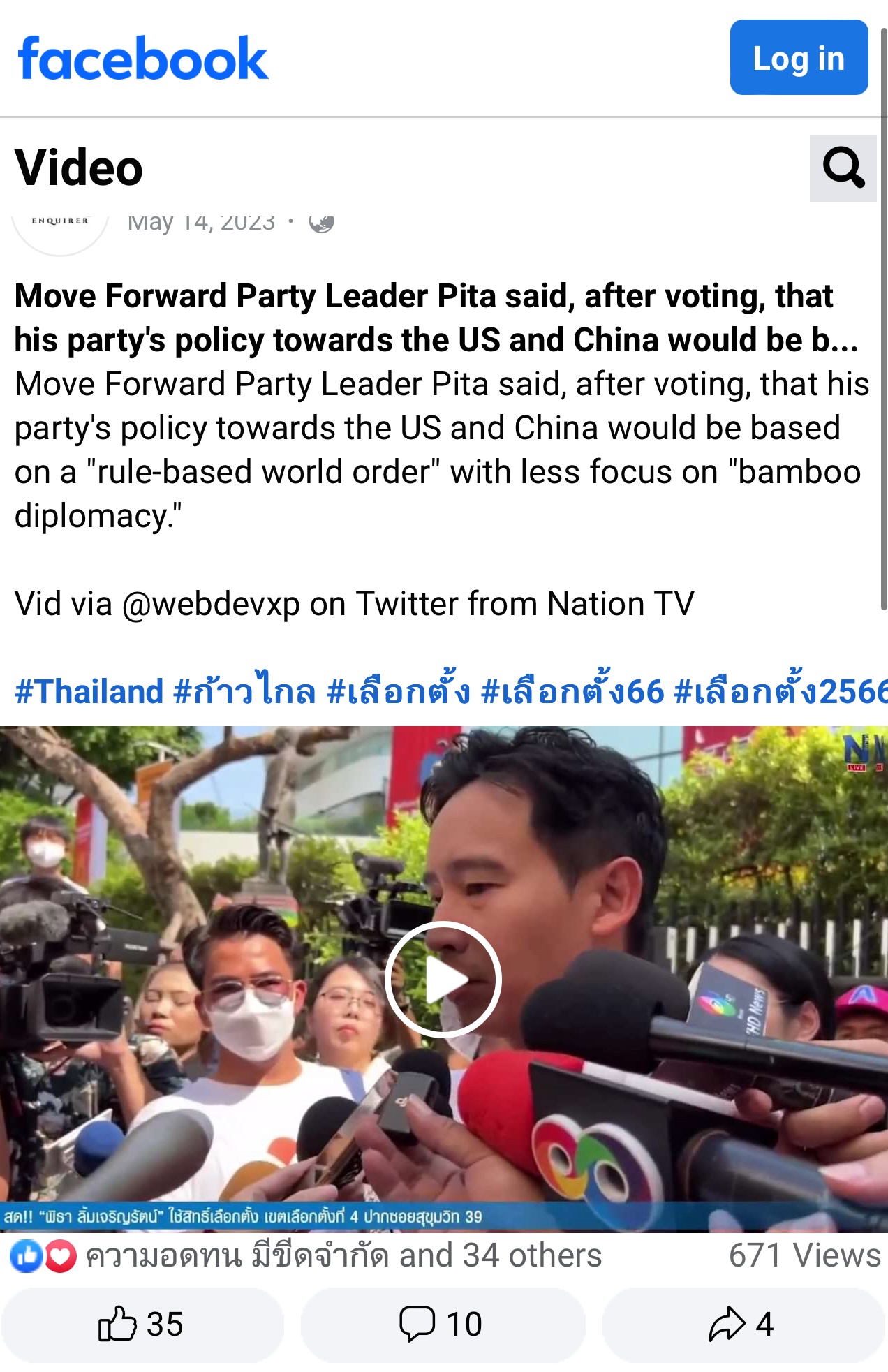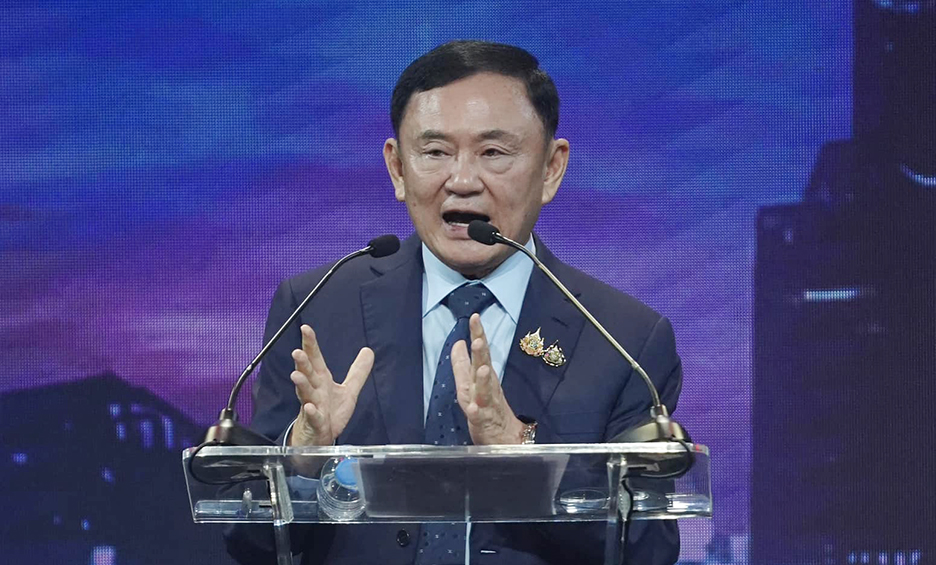Thailand’s neutrality and foreign policy: Why I’d vote for Thaksin over Pita
In the following Letter to the Editor, a Thai viewer of the Neutrality Studies YouTube Channel expresses their rationale for supporting the Pheu Thai Party of former prime minister and current de-facto leader of the new government, Thaksin Shinawatra, rather than the popular alternative, Moving Forward Party, under the charismatic Pita Limjaroenrat. All views expressed are the authors.
Thaksin Shinawatra, a realist figure in Thai politics, is shrouded in a slew of controversies, even allegations of crimes, but, at the same time, he also has tangible and measurable successes on his belt, ranging from national debt relief, infrastructure projects, a universal healthcare program, and localized SME developments, which lasts to this day. Pita Limjaroenrat, on the other hand, can be best characterized as an idealist who often displays in parliament as ‘the perfect man’, educated, well articulated, with integrity, showing off real maturity, restraint, and flexibility in politics when pressured due to his controversial ‘unroot the establishment’ policy. Ultimately, he picked the wrong fight with the wrong people and didn’t get a chance to show his abilities.
In today’s shifting multipolar world where every nation has to find its own new footing with US-EU-China-Russia-Israel-Middle East conflicts in mind, whether it’s supply chain security, trade routes, or new economic opportunities. Here is how Pita and Thaksin differ, and this is why I would still vote for Thaksin (or any of his proxies) in the near future. The main issue lies with Thaksin’s Geopolitical Realism vs Pita’s Political Idealism.
Thaksin Shinawatra
Thaksin comes across as a realist thinker for foreign policy, international relations, and trade. Amoral, opportunist, neutral. In today’s world. I believe this is what we need, and that’s why I voted for him and will continue to do so until someone stronger in this regard shows up.
In his first “foreign policy speech” after coming back to power by way of his daughter becoming the new prime minister, Thaksin laid out some important elements of his foreign policy agenda:
“Connect the world with high-speed rail from Bangkok to Nong Khai, which must be completed to link with China’s Silk Road initiative
Thaksin recognized global geopolitics as both an opportunity and a challenge for Thailand, especially in the context of U.S.-China trade relations, urging the country to position itself within global supply chains.
To restructure industries, we must attract investment. The former Prime Minister cited NVIDIA, a technology company that is expanding opportunities in semiconductors. Thailand should position itself as the safest haven for the industry.
Anyone who wants to sell to China, America, or Europe can set up in Thailand without any problems, as we do not face geopolitical issues.
There is significant interest in establishing data centers in Thailand, but challenges remain regarding electricity costs and clean energy.
With Chinese EVs (Electric Vehicles) entering the market, I suggest Thailand becomes a production hub for right-hand drive vehicles.
Regarding the automotive industry ecosystem, as combustion vehicles are phased out, we need to negotiate to ensure Chinese electric vehicles use Thai components or local content.
China is developing and launching a large number of satellites; Thailand should negotiate to collaborate.
Thai SMEs are struggling because they are too similar to each other, leading to market domination by Chinese products. We need to improve and design products to be more unique to compete, while also ensuring protection and fairness.”
These goals are realistic and believable. Thaksin’s geopolitical and international trade acumen has been proven in the past, how he leveraged his connections with the West, in the time of Bush during the unjustified war in Iraq, even committing Thai troops to the cause. The outcome was he relieved Thailand’s foreign debt to the International Monetary Fund, which doubled in the 1997 financial crisis when George Soros made a profit out of Thailand’s economic demise with currency rate manipulation. Thaksin probably profited from this too, but the past was an important marker of his achievement in tangible foreign policy. And now, Thaksin’s geopolitical acumen is re-emerging in the present, he has pivoted to China, with goals and strategies to engage and thrive in China’s backyard as it rises as an economic power amidst geopolitical tensions with the West.
Thaksin is no angel, his crimes and exploits are open information. But I would vote for him instead of Pita, because of his all-important foreign policies. Peace and trade are the foundation of well-being, which is the foundation of the rule of law and the will to strive for equality and democracy. That’s my logic.
Pita Limjaroenrat
So let’s look at Pita’s vision and why I didn’t vote for him. The following is an extract from an interview he gave in The Diplomat in February 2024.
“[The Diplomat:] Thai diplomats have long espoused a “flexible,” perhaps amoral, short-term interest approach to foreign policy. Your campaign focused on a longer-term interests or values-oriented approach, which seemed to mark a break from existing foreign policy approaches. How would you describe your campaign’s positions in relation to recent Thai foreign policy? What policies would you want to change?
[Pita Limjaroenrat:] In today’s foreign policy, it’s “no words, no weight.” If you don’t show your position, then you are not relevant under the emerging world order. There will be times when quiet diplomacy works better than being loud about your values. But for countries like Thailand, the second largest economy of ASEAN and a middle power, if you don’t speak up on critical moments, then you are no longer relevant in the world order.
Without a clear direction of mutual boon for countries, you cannot rebalance and you cannot achieve the status of a middle power. You will punch below your weight all the time. When that happens, the indirect impacts that your diplomacy tries to dodge will come to your doorstep anyway”
My foreign policy priority is to bring back ASEAN centrality with the region’s emerging new leaders. Singapore will have Lawrence Wong, another Harvard alum, [as the prime minister after a planned leadership transition] and Indonesia will have their election soon. [Editor’s note: Indonesians voted on February 14, with Defense Minister Prabowo Subianto claiming victory based on preliminary results.] With Malaysia and the Philippines, the five founding members of ASEAN can achieve that relevance and centrality back.
See what he did here? He’s talking about ASEAN centrality, while citing US-leaning Malaysia, Philippines, and Singapore, all the while not mentioning China-leaning Vietnam, Cambodia, and Laos. I don’t know if he’s aware of it, but the language suggests he’s choosing sides.
Although Pita’s policies sounded brave and proactive, his stance on where Thailand should stand in geopolitics, however, puts us in much more danger than he seems to realize. Look at this video immediately after finding out he won the election in May 2023.

He said “no more silent bamboo policy”, but rather a “rules-based international order” – I would hope he means the United Nations Charter, rather than the “rules-based international order” that US Foreign Minister Anthony Blinken, EU Commission President Von Der Leyen, and NATO Chief Jens Stoltenberg chants all the time. Because either Pita simply used the wrong term, or he meant sticking primarily with the West to contain Russia China, and other states challenging the West’s “rules-based international order” (who’s rules anyway? Rules for ye, but not for thee?”)
Pita then goes on to say “We will have a strategic response of mutual benefits whether its US or China, because there’s no use taking sides in today’s world.” He’s saying all the right things – but is he doing it?
Pita’s Rhetoric on Myanmar
Not long after this, Pita started talking about delivering ‘non-lethal aid” to Myanmar’s rebels fighting the Junta, supposedly “pro-democratic forces” portrayed in Western media, but anyone reading this knows better than the various ethnic armed rebels have their own interests and this is why Myanmar is the world’s longest civil war, nearly a century now.
Pita highlighted the importance of the Burma Act, which he said Thailand would use to “start working with the international community to make sure that we have the right amount of pressure and incentives for people to resolve their conflict.” Passed by the US Congress last December, the Burma Act authorizes US funding of non-lethal support for resistance forces in Myanmar.
Recently, Pita told a senior official from the World Economic Forum that the Move Forward-led government will revive Thailand’s leading role in ASEAN and work to lessen the violence in Myanmar. This got a very harsh response from the Myanmar Junta: “The Move Forward Party is pro-West and they will assist terrorists … we have to watch the border and get information about them, their movements, and their activities,” The Irrawaddy has learned. The “terrorists” he refers to in the message are anti-Myanmar regime resistance groups active along the border.
Pita, citing US Congress acts to justify proxy war in Myanmar, citing the warmongering terminology eg. “rules-based order” that NATO used to justify the proxy war with Russia, attending the World Economic Forum, but not attending BRICS, – it sure looks like he’s choosing sides while his country is situated in the backyard of China, surrounded by China proxies.
I regard Pita highly as a new-generation politician, he shows promising capability across the board but it pains me to see him making these dangerous foreign policy mistakes that give the opposition even more leverage to get rid of him.
New Realities
Earlier in August 2024, The Thai establishment delivered the finishing blow to dissolve Pita’s West-leaning liberal progressive Move Forward Party through a Thai Constitutional Court ruling that the party had violated the constitution by proposing to amend a law that forbids defaming the country’s royal family.
Pita made things worse for him regarding geopolitical neutrality by gathering with G7 and NATO members a week before his party’s dissolution— begging the West for support. Some observers correctly noted that “the meeting between Pita Limjaroenrat, the chief adviser to the Move Forward Party chairman, and diplomats from 18 countries, including the UK, South Korea, Japan, France, the US, Canada, the EU, Sweden, and Germany, at the German residence took place six days before the Constitutional Court’s decision on Wednesday. Therefore, some people criticized this action as a breach of political etiquette and interference.”
What was Pita hoping to achieve? Get the Western press to further polarize Thailand as authoritarian and undemocratic? He’s not wrong in labeling the current governance system as such, but it does not do Thailand any favors with Sino-Thai relations nor its relations with immediate China-leaning neighbors Myanmar, Cambodia, and Laos. I sure hope he wasn’t trying to get G7 and NATO to come and ‘democratize’ Thailand with external influences, which can only mean regime change, color revolution, or proxy war.
Here we are
A flawed democracy, or even electoral autocracy like Thailand, is not unusual for this region of the world. And I’m just glad that Thaksin is back in the game because he’s a better choice than the ineffective (although BRICS-leaning) military Junta on civilian and economic matters, and infinitely safer than the purely west-leaning Move Forward Party from a geopolitical perspective. I personally believe the Thai establishment also sees value in Thaksin’s geopolitically neutral national strategy, to the extent that despite previous bad relations between Thaksin and the establishment spanning two decades — news of Thaksin receiving the royal pardon for all his crimes and allegations that led to his exile, allowing him to resume political center stage is extremely significant. I think the establishment put Thaksin in the steering wheel to navigate Thailand through the next decade of geopolitical turmoil to keep Thailand’s people safe and provided for, thereby also guaranteeing the stability of the establishment. I’m sad that Thailand has taken a step back with regard to democracy, but the outcome was rather serendipitous for ensuring Thailand’s geopolitical neutrality which is all important in the coming years.

